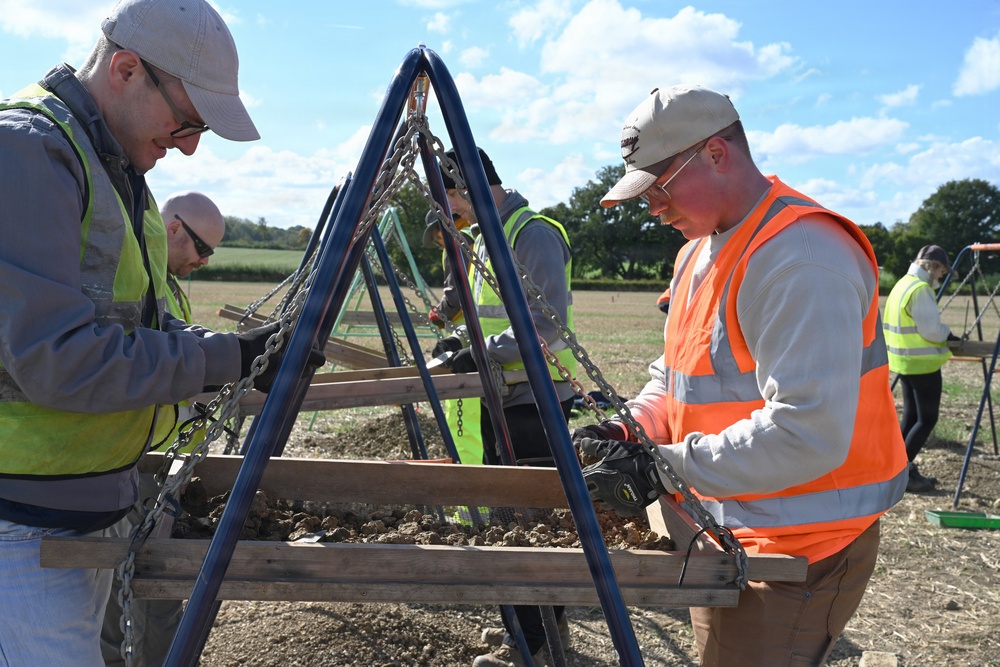DVIDS – News – 10th Special Forces Group (Airborne) Enhances NATO Partner Forces’ Quality of Life with Dental Care
By: SSG Liseth Espinel
10th Special Forces Group (Airborne)
CAMP MIRON, Poland — For Lt. Col. Jesse Thietten, Doctor of Dental Surgery with the 10th Special Forces Group (Airborne), combat readiness takes a different meaning. It’s not just the training or equipment that leads to combat effectiveness, instead it’s about keeping the human body healthy and improving quality of life through dentistry.
Thietten and the 10th SFG (A) dentistry team has extended that crucial care to NATO partner forces while in Europe, giving them the same care and in turn, combat readiness that is typically reserved to U.S. military forces.
“Like most of them, this man came to us seeking relief from tooth pain,” Thietten commented on March 10, 2025 while providing treatment to a NATO partner soldier. “But this man’s story was different. Many years ago, he lost the confidence to smile because of a fracture in his front tooth. He has been hiding his smile from those around him; even his five-year-old daughter has never seen her dad smile. So, we decided to help him and allow a soldier to rediscover his smile and confidently enjoy his time with his family before returning to a combat zone.”
Going to the dentist is rarely seen as enjoyable, but for NATO partner forces dealing with tooth pain, dental care improves their quality of life and enhances their readiness to be mission ready.
“Our biggest priority is always trying to get close to them,” said Thietten. “Proximity is important because they train the whole day, and in their free time, usually through the night, they allow us to provide dental care.”
Some NATO partner forces do not have easy access to dental care during joint readiness exercises. Thietten stated that freedom of movement for medical care will be limited in future conflicts, and service providers must be able to operate in remote locations. This is why 10th SFG (A) provides dental support to the U.S. Allies and partners capabilities, even in isolated training centers.
Thietten said his team has become more efficient at providing a wider spectrum of care through years of working in austere environments. “The first time we were working in a regular dental clinic. We were using our rental car to pick them up and drive them to the closest U.S. dental clinic,” said Thietten. “We would see patients from 5 a.m., before the clinic opened, work our duty hours, and return to open the clinic around 7 p.m. to continue working. There were long hours, but it didn’t matter as long as we could provide dental services.”
After the first experience, Thietten and his dental specialist set up a dental kit the size of a suitcase to support NATO partner forces at their training site. Equipped with a mobile X-ray and a portable dental unit, they can provide essential care wherever needed.
Thietten is a specialist capable of providing root canals, oral surgery, complex restorative, and aesthetics. “At our last location, 44% of the guys were experiencing tooth pain of some sort, and 25% of them had moderate to severe dental pain,” said Thietten. “Due to years of conflict in Eastern Europe, our partners have limited access to care, and dental is not their top concern. So, a large number of them have large cavities and fractured teeth.”
When they provide dental care, the dental team tries to minimize the use of translators, as they are needed to provide support during the training exercise. So, to overcome the communication barrier, Thietten developed a bilingual sheet with questions and answers in English and their language. That way, the NATO partner forces can point at their responses. A method that enables communication and effective care without disrupting the training process.
“We have partner forces that are at war,” said Thietten. “Any support we can provide is crucial. While we cannot assist in the front lines, we can provide them easy access to care, so they are ready when they return to the fight.”
Providing dental care to NATO partner forces strengthens our alliances and enhances our ability to support the readiness of our Soldiers. Dental teams like those at 10th SFG (A) can test and refine the equipment with this care. This ongoing exchange of knowledge and resources ensures we are always prepared, no matter where or when the mission calls.
-30-
| Date Taken: | 03.10.2025 |
| Date Posted: | 04.15.2025 04:11 |
| Story ID: | 495316 |
| Location: | PL |
| Web Views: | 7 |
| Downloads: | 0 |
PUBLIC DOMAIN

This work, 10th Special Forces Group (Airborne) Enhances NATO Partner Forces’ Quality of Life with Dental Care, by SSG Liseth Espinel Cuervo, identified by DVIDS, must comply with the restrictions shown on https://www.dvidshub.net/about/copyright.


 Private Internet Access gives you unparalleled access to thousands
of next-gen servers in over 83 countries and each US state. Your
VPN experience will always be fast, smooth, and reliable.
Private Internet Access gives you unparalleled access to thousands
of next-gen servers in over 83 countries and each US state. Your
VPN experience will always be fast, smooth, and reliable.

